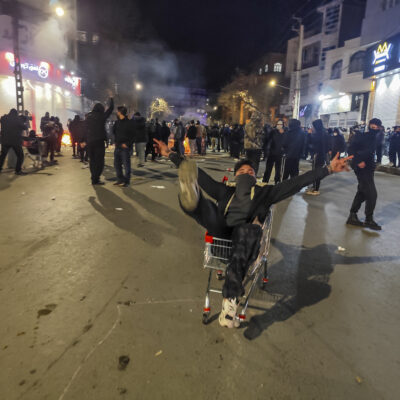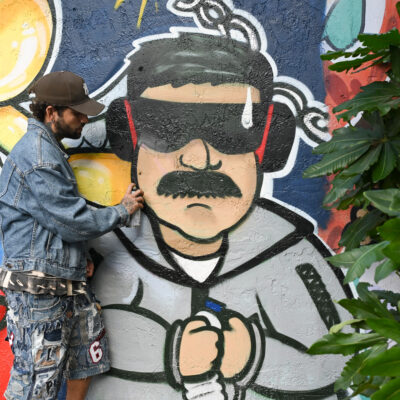
Israeli-American tequila aficionados make the Negev bloom with agave
Negave Estates is producing Israeli agave-based spirits with top experts from Mexico
A visit to the retirement home of Israel’s first prime minister, David Ben-Gurion, in Kibbutz Sde Boker in the Negev Desert may inspire thoughts about leadership and the pioneering spirit of Israel’s founders. For one group of friends visiting from the U.S., a trip to the cabin in southern Israel in 2016 brought something entirely different to mind: tequila.
“I was in the Ben-Gurion [Desert Home] souvenir shop,” David Niewood recalled, “and they were selling wine and touting how they were growing grapes in the desert. A thought instantly came to me: Why aren’t they growing agave?”
Agave is a succulent native to arid parts of the Americas that can be used to produce spirits, including tequila.
About five years later, Niewood and his friend and fellow tequila aficionado Stafford Fitzgerald Haney, the former U.S. ambassador to Costa Rica who had moved to central Israel, and a few other friends from Englewood, N.J., started working on establishing Negave Estates, their own company to produce agave-based drinks in the Negev. (The term “tequila” is used for agave-based drinks produced in specific parts of Mexico.)
“We talked about it with a little bit of suspicion,” Niewood recalled. “It seemed so obvious that we didn’t understand why it hadn’t already happened.”
Niewood, Haney and their friends read up on the millennia-long history of fermenting spirits in the Negev Desert, and found that not only had agave been grown at an industrial scale in the Negev in the past, but it was Ben-Gurion who spurred it. Then the head of the Jewish Agency, Ben-Gurion had agave plants brought to pre-state Israel and planted in the Negev in 1943 to produce fiber for rope and sacks; the industry lasted for two decades.
“The more I looked into it, the more I realized it had to happen,” Niewood said of producing an agave-based spirit.
Haney, who lived in Mexico twice in the past, traveled to make contacts in the tequila world, where he met with Ana Maria Romero Mena, a world-class expert on the drink who created a wheel of 600 aromas widely used in the industry.
“It was bashert,” Haney said, using the Yiddish word for fate. “I met with her in a restaurant in Guadalajara, and she said she had asked God to give her a sign of what to do with her life. Suddenly, a job from Israel shows up. She’s very Catholic and spiritual, and she said this was God’s way of telling her she needed to get involved.”

Jose Aceves, a third-generation tequilero and the head of Casa Aceves, one of the leading tequila makers in Mexico, is also working with Negave. He recently did a DNA test and found that his grandmother was 30% Jewish, Haney said.
Negave also brought in Michael Ward, the former global head of innovation for Diageo, a British multinational company that is a major distributor of Scotch and other alcoholic drinks, as well as Yitzhak Carmy, an agronomist and third-generation resident of the Negev.
With a professional team on board, Haney said, “we were very buoyed by the fact that we were not the only crazy ones out there.”
“This was the marriage of Mexican tradition with Israeli innovation,” Haney said. “Everyone thought it was a great opportunity to take all the knowledge and experience that Mexico has and to use Israeli techniques that Mexico doesn’t have today.”
Like wine, and unlike whiskey, tequila has a terroir – meaning the soil in which it is grown affects the taste.
“We wanted to do this 100% from ground to glass in Israel,” Niewood said.

Romera Mena and her team came to Israel and found that the terroir in the Negev was similar to that of lowland agave from Mexico. She created a distillate that she brought to Israel to age with agave from the Negev to create a hybrid drink that would take about two years to be ready, instead of the five years that it would take to start from scratch.
That drink, which needs 12-18 more months of aging in Hungarian and French oak barrels, is being called Negave Iconic, and is available by the case for pre-sale. They are expected to be delivered in time for Passover 2026 – and to be kosher-for-Passover.
Meanwhile, planting began on Negave Estates’ farm in early September.
Negave Estates also plans to host events to educate Israelis more about tequila, where it is less popular than in the U.S.
“It’s an opportunity to slowly build the cash flow and improve the reputation we are going to build over time,” Niewood said.
Haney said that he has heard excitement that they are opening a business in the Negev after the Oct. 7 Hamas attacks on Israel, and that buying a case of Negave Iconic is a way to “participate in rebuilding the Negev … [and] support something new in Israel for those who love tequila or love the viticulture scene.”






